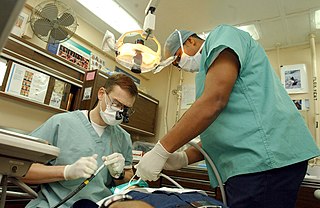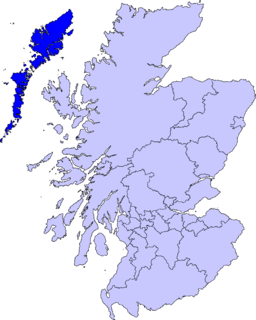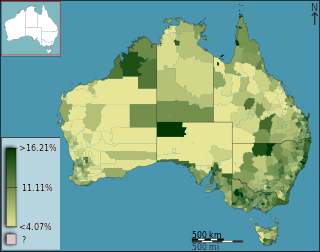Related Research Articles
In the medical profession, a general practitioner (GP) is a medical doctor who treats acute and chronic illnesses and provides preventive care and health education to patients of all ages.

A dentist, also known as a dental surgeon, is a health care professional who specializes in dentistry. The dentist's supporting team aids in providing oral health services. The dental team includes dental assistants, dental hygienists, dental technicians, and sometimes dental therapists.

The British Dental Association (BDA) is a registered trade union for dentists in the United Kingdom.
The Constitution Alteration Bill 1946, was a successful proposal to alter the Australian Constitution to give the Commonwealth power over a range of social services. The question was put to a referendum in the 1946 Australian referendum with two other (unrelated) questions. It was carried and inserted into section 51 of the Australian Constitution.

A dental hygienist or oral hygienist is a licensed dental professional, registered with a dental association or regulatory body within their country of practice. Prior to completing clinical and written board examinations, registered dental hygienists must have either an Associate's or bachelor's degree in Dental Hygiene from an accredited college or university. Once registered, hygienists are primary healthcare professionals who work independently of or alongside dentists and other dental professionals to provide full oral health care. They have the training and education that focus on and specialize in the prevention and treatment of many oral diseases.

Employee benefits and benefits in kind include various types of non-wage compensation provided to employees in addition to their normal wages or salaries. Instances where an employee exchanges (cash) wages for some other form of benefit is generally referred to as a "salary packaging" or "salary exchange" arrangement. In most countries, most kinds of employee benefits are taxable to at least some degree. Examples of these benefits include: housing furnished or not, with or without free utilities; group insurance ; disability income protection; retirement benefits; daycare; tuition reimbursement; sick leave; vacation ; social security; profit sharing; employer student loan contributions; conveyancing; long service leave; domestic help (servants); and other specialized benefits.
Family medicine is a medical specialty within primary care that provides continuing and comprehensive health care for the individual and family across all ages, genders, diseases, and parts of the body. The specialist, who is usually a primary care physician, is named a family physician. It is often referred to as general practice and a practitioner as a general practitioner. Historically, their role was once performed by any doctor with qualifications from a medical school and who works in the community. However, since the 1950s, family medicine / general practice has become a specialty in its own right, with specific training requirements tailored to each country. The names of the specialty emphasize its holistic nature and/or its roots in the family. It is based on knowledge of the patient in the context of the family and the community, centering on disease prevention and health promotion. According to the World Organization of Family Doctors (WONCA), the aim of family medicine is "promoting personal, comprehensive and continuing care for the individual in the context of the family and the community". The issues of values underlying this practice are usually known as primary care ethics.
NHS National Services Scotland (NSS) is a Non Departmental Public Body which provides advice and services to the rest of NHS Scotland.
General medical services (GMS) is the range of healthcare that is provided by general practitioners as part of the National Health Service in the United Kingdom. The NHS specifies what GPs, as independent contractors, are expected to do and provides funding for this work through arrangements known as the General Medical Services Contract. Today, the GMS contract is a UK-wide arrangement with minor differences negotiated by each of the four UK health departments. In 2013 60% of practices had a GMS contract as their principle contract. The contract has sub-sections and not all are compulsory. The other forms of contract are the Personal Medical Services or Alternative Provider Medical Services contracts. They are designed to encourage practices to offer services over and above the standard contract. Alternative Provider Medical Services contracts, unlike the other contracts, can be awarded to anyone, not just GPs, don't specify standard essential services, and are time limited. A new contract is issued each year.

NHS Scotland, sometimes styled NHSScotland, is the publicly funded healthcare system in Scotland, and one of the four systems which make up the National Health Service in the United Kingdom. It operates fourteen territorial NHS boards across Scotland, seven special non-geographic health boards and NHS Health Scotland.
Health and Social Care (HSC) is the publicly funded healthcare system in Northern Ireland. Although having been created separately to the National Health Service (NHS), it is nonetheless considered a part of the overall national health service in the United Kingdom. The Northern Ireland Executive through its Department of Health is responsible for its funding, while the Public Health Agency is the executive agency responsible for the provision of public health and social care services across Northern Ireland. It is free of charge to all citizens of Northern Ireland and the rest of the United Kingdom.

NHS Western Isles is an NHS board serving the Outer Hebrides of Scotland. It is one of the fourteen regions of NHS Scotland. NHS Western Isles is responsible for providing primary and secondary healthcare to the 26,000 people in the Outer Hebrides. It employs over 1,000 staff.

The National Health Service Act 1946 came into effect on 5 July 1948 and created the National Health Service in England and Wales thus being the first implementation of the Beveridge model. Though the title 'National Health Service' implies a single health service for the United Kingdom, in reality one NHS was created for England and Wales accountable to the Secretary of State for Health, with a separate NHS created for Scotland accountable to the Secretary of State for Scotland by the passage of the National Health Service (Scotland) Act 1947. Similar health services in Northern Ireland were created by the Northern Ireland Parliament through the Health Services Act 1948.

Health care in Australia is primarily funded through the public Medicare program and delivered by highly regulated public and private health care providers. Individuals may purchase health insurance to cover services offered in the private sector and further fund health care. Health is a state jurisdiction although national Medicare funding gives the Australian or Commonwealth Government a role in shaping health policy and delivery.
A Health and welfare trust (HAWT) or Health and welfare plan (HAWP) is a tax-free vehicle for financing a corporation's healthcare costs for their employees. They were introduced in 1986 by Canada Revenue Agency (CRA) in their interpretation bulletin entitled IT-85R2. Many companies offer this product to Canadian employers.
Healthcare in Slovenia is organised primarily through the Health Insurance Institute of Slovenia. In 2015, healthcare expenditures accounted for 8.10% of GDP. The Slovenian healthcare system was ranked 15th in the Euro health consumer index 2015. The country ranked second in the 2012 Euro Hepatitis Index.

A healthcare center, health center, or community health center is one of a network of clinics staffed by a group of general practitioners and nurses providing healthcare services to people in a certain area. Typical services covered are family practice and dental care, but some clinics have expanded greatly and can include internal medicine, pediatric, women’s care, family planning, pharmacy, optometry, laboratory testing, and more. In countries with universal healthcare, most people use the healthcare centers. In countries without universal healthcare, the clients include the uninsured, underinsured, low-income or those living in areas where little access to primary health care is available. In the Central and East Europe, bigger health centers are commonly called policlinics.

The Pakistan Medical Commission , previously known as Pakistan Medical & Dental Council), is a statutory regulatory authority that maintains the official register of medical practitioners within Pakistan. Its chief function is to establish uniform minimum standard of basic and higher qualifications in medicine and dentistry throughout Pakistan by controlling entry to the PMC register of medical practitioners within Pakistan and suspending or removing members when necessary. It also sets the education standards for Medical Colleges in Pakistan along with the Higher Education Commission.
Dentistry provided by the National Health Service in the United Kingdom is supposed to ensure that dental treatment is available to the whole population. Most dentistry is provided by private practitioners, most of whom also provide, on a commercial basis, services which the NHS does not provide, largely cosmetic. Most adult patients have to pay some NHS charges, although these are often significantly cheaper than the cost of private dentistry. The majority of people choose NHS dental care rather than private care: as of 2005, the national average proportion of people opting for private care was 23%. NHS dentistry is not always available and is not managed in the way that other NHS services are managed.

Private medicine in the UK, where universal state-funded healthcare is provided by the National Health Service, is a niche market.
References
- ↑ "Scottish Dental Practice Board". Scottish Dental. 7 October 2008. Retrieved 12 July 2015.
- ↑ "Payment Verification". Practitioner Services. National Services Scotland. Retrieved 12 July 2015.